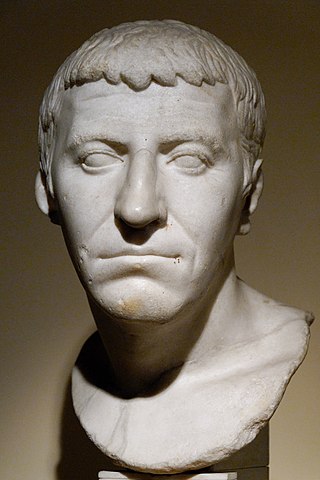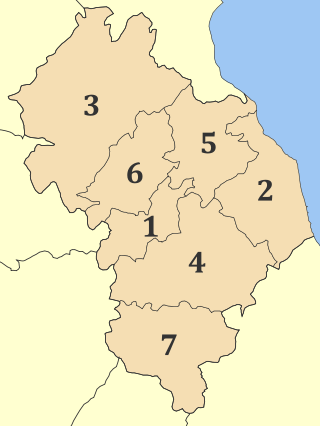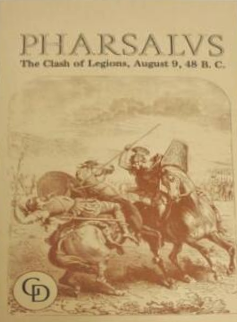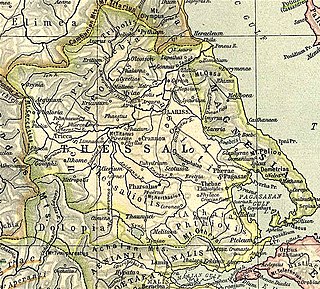
The Battle of Pharsalus was the decisive battle of Caesar's Civil War fought on 9 August 48 BC near Pharsalus in Central Greece. Julius Caesar and his allies formed up opposite the army of the Roman Republic under the command of Pompey. Pompey had the backing of a majority of Roman senators and his army significantly outnumbered the veteran Caesarian legions.

Gaius Cassius Longinus was a Roman senator and general best known as a leading instigator of the plot to assassinate Julius Caesar on 15 March 44 BC. He was the brother-in-law of Brutus, another leader of the conspiracy. He commanded troops with Brutus during the Battle of Philippi against the combined forces of Mark Antony and Octavian, Caesar's former supporters, and committed suicide after being defeated by Mark Antony.

Legio XIII Gemina, in English the 13th Twin Legion was a legion of the Imperial Roman army. It was one of Julius Caesar's key units in Gaul and in the civil war, and was the legion with which he crossed the Rubicon in January, perhaps the 10th, 49 BC. The legion appears to have still been in existence in the 5th century AD. Its symbol was the lion.
In Greek mythology Phthia was a city or district in ancient Thessaly. It is frequently mentioned in Homer's Iliad as the home of the Myrmidons, the contingent led by Achilles in the Trojan War. It was founded by Aeacus, grandfather of Achilles, and was the home of Achilles' father Peleus, mother Thetis, and son Neoptolemus.

Farsala, known in Antiquity as Pharsalos, is a city in southern Thessaly, in Greece. Farsala is located in the southern part of Larissa regional unit, and is one of its largest towns. Farsala is an economic and agricultural centre of the region. Cotton and livestock are the main agricultural products, and many inhabitants are employed in the production of textile. The area is mostly famous for being the birthplace of Achilles, a mythical ancient Greek hero and the sight of a major battle between Roman generals Gaius Julius Caesar and Gnaeus Pompeius Magnus in 48 BC.

Larissa is one of the regional units of Greece. It is part of the region of Thessaly. Its capital is the city of Larissa. Total population 269,151 (2021).
Menon of Pharsalus may refer to:
Palaepharsalus or Palaipharsalos was a town of ancient Thessaly, from which the town moved to the later location of Pharsalus.
The First Peloponnesian War was fought between Sparta as the leaders of the Peloponnesian League and Sparta's other allies, most notably Thebes, and the Delian League led by Athens with support from Argos. This war consisted of a series of conflicts and minor wars, such as the Second Sacred War. There were several causes for the war including the building of the Athenian long walls, Megara's defection and the envy and concern felt by Sparta at the growth of the Athenian Empire.
The Farsala Trilogy is a series of three fantasy novels by Hilari Bell that includes Flame, Rise of a Hero, and Forging the Sword.
Polydamas of Pharsalus was a Thessalian statesman from Farsala. He was entrusted by his fellow-citizens about 375 BC, with the supreme government of their native town. Polydamas formed an alliance with Sparta, with which state his family had long been connected by the bonds of public hospitality (proxeny), but he soon after entered into a treaty with Jason of Pherae. On the murder of Jason in 370 BC, his brother Polyphron, who succeeded to his power, put to death Polydamas and eight other most distinguished citizens of Pharsalus.

The Battle of Pharsalus was fought in late 1277 at the plain of Pharsalus in Thessaly between an invading Byzantine army led by the megas stratopedarches John Synadenos and megas konostaulos Michael Kaballarios, and the forces of John I Doukas, ruler of Thessaly. This was the first major Byzantine campaign against Thessaly after the failure of the previous expedition at the Battle of Neopatras. The battle resulted in a crushing victory for John Doukas: Synadenos was captured, while Kaballarios died shortly afterwards of his wounds.
Lofos may refer to several settlements in Greece:

The Battle of Velestino comprised two separate combats, which took place on 27 April [O.S. 15 April] 1897–30 April [O.S. 18 April] 1897 and 5 May [O.S. 23 April] 1897–6 May [O.S. 24 April] 1897, between the Greek and Ottoman armies at Velestino in Thessaly, as part of the Greco-Turkish War of 1897.

The Exaltation of the Flower is the modern title given to an early Classical Greek marble fragment of a funerary stele from the 5th century BCE. It was discovered in 1861 by Léon Heuzey and Honoré Daumet at a church in Farsala, Thessaly, Greece. Carved in bas-relief in the severe style, the extant upper fragment of the marble relief stele depicts two women holding what appear to be flowers or other objects. The work is held by the Louvre museum in the Department of Greek, Etruscan, and Roman Antiquities.
The Metropolis of Larissa and Tyrnavos is a Greek Orthodox metropolitan see in Thessaly, Greece.
The siege of Curicta was a military confrontation that took place during the early stages of Caesar's Civil War. Occurring in 49 BC, it saw a significant force of Populares commanded by Gaius Antonius besieged on the island of Curicta by an Optimate fleet under Lucius Scribonius Libo and Marcus Octavius. It immediately followed and was the result of a naval defeat by Publius Cornelius Dolabella and Antonius eventually capitulated under prolonged siege. These two defeats were some of the most significant suffered by the Populares during the civil war.

Pharsalus: The Clash of Legions, August 9, 48 B.C. is a board wargame published by Game Designers' Workshop (GDW) in 1977 that simulates the Battle of Pharsalus, which decided who would rule the Roman Empire, Pompey or Julius Caesar.
This page is based on this
Wikipedia article Text is available under the
CC BY-SA 4.0 license; additional terms may apply.
Images, videos and audio are available under their respective licenses.









